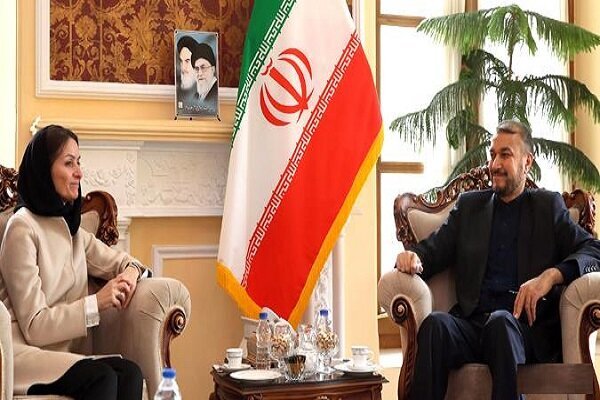Denmark urges all JCPOA signatories to honor their obligations

TEHRAN - Christina Markus Lassen, political director at the Danish Ministry of Foreign Affairs, on Wednesday voiced her country’s concern over the activation of the dispute mechanism in the nuclear deal by the European sides, urging all signatories to the Joint Comprehensive Plan of Action (JCPOA) to adhere to their commitments.
In a meeting with senior advisor to the Iranian Parliament Speaker Hossein Amir Abdollahian in Tehran, the Danish diplomat said, “Denmark calls on all sides to return to their obligations and adhere to their undertakings.”
She further said that utilizing diplomacy is the only way out of the current critical situation to protect the region against the existing threat of war.
Lassen later highlighted Iran’s key role and standing in the region, saying, “Continuation of talks and friendly relations with Iran is of great importance in Denmark’s foreign policy.”
Amir Abdollahian, for his part, said that the U.S. unilateral measures have led the world towards severe widespread insecurity.
On Monday, Foreign Minister Mohammad Javad Zarif warned that Iran would consider quitting the nuclear Non-Proliferation Treaty (NPT) if the Europeans refer Iran’s nuclear case to the UN Security Council.
“If they (Europeans) take any action, the issue of quitting the NPT will be raised based on the letter of the President dating May 2018,” Zarif said.
France, Germany and the United Kingdom, the three European states signatory to the JCPOA, issued a joint statement on January 14, announcing they formally triggered the dispute mechanism which could bring the issue before the UN Security Council.
“Steps in reducing the [JCPOA] commitments have already been taken. However, Iran will quit the NPT if the Europeans continue their behavior or send Iran’s case to the Security Council,” Zarif stated.
Zarif went on to say that the Foreign Ministry is legally pursuing the triggering of dispute mechanism by the European trio.
“The Islamic Republic of Iran officially started the dispute mechanism in May 2018 after the United States’ withdrawal from the JCPOA. Three letters were sent to Mrs. Mogherini [then European Union foreign policy chief] on May 10, 2018, August 26, 2018, and November 2018 in which it was announced officially that Iran has started the dispute mechanism.”
He added, “In the letter which was sent in November 2018, we said that Iran has started the dispute mechanism and therefore, we have no choice but to reduce commitments to the JCPOA.”
“After the aforementioned letter, the Islamic Republic of Iran gave the European Union seven months and then started to reduce the JCPOA commitments in May 2019,” the foreign minister explained.
Zarif noted that Iran will reverse its decision once the Europeans return to their commitments.
U.S. President Donald Trump quit the JCPOA in May 2018 and introduced the harshest ever sanctions in history on Iran as part of his administration’s “maximum pressure” strategy against Iran.
The European countries failed to protect Iran’s benefits from the deal and after patiently watching for more than a year and seeing no clear action from the European sides, Iran started to partially reduce its commitments.
Under the dispute resolution mechanism, countries have 30 days to resolve the problem, though that can be extended. If it cannot be solved, the matter could be brought before the UN Security Council and could then result in the snapback of sanctions that had been lifted under the deal, according to The Guardian.
MJ/PA
